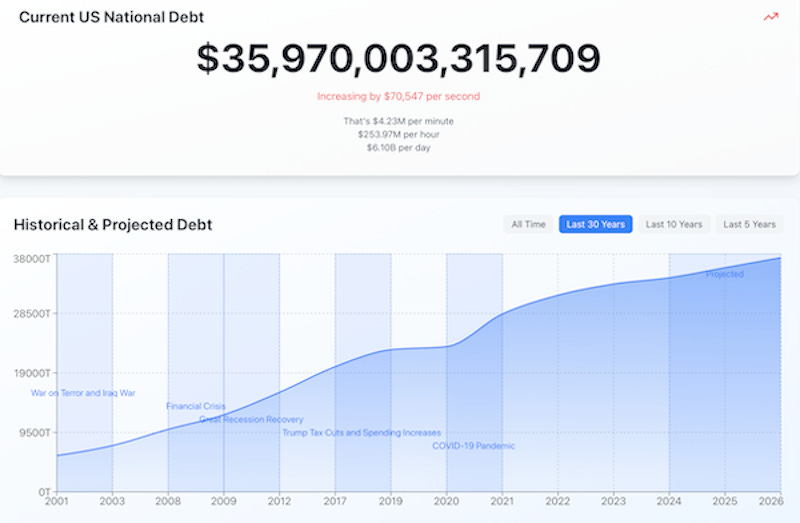The Debt Dilemma: Is The U.S. Military Bearing the Cost And Endangering Everyone?
The young today often dismiss history as a useless endeavour, and there is a confirmation bias for this belief because our educational institutions fail to teach history substantively. However, history very often repeats itself, and by learning about the past, we can have a window into what may befall us going forward.
British past historian Arnold Toynbee and current historian Sir Niall Ferguson have commented on why great civilizations collapse. They point out that virtually every major civilization died not from the outside but from within. It takes the form of a slow national suicide. The question then becomes, is America reaching the tipping point where it’s on the edge of collapse as a great power? Are Americans delusional into believing that America always comes back or that America is unique and can’t happen?
There is a commonality to the collapse of great powers. One is that these empires have autocratic leaders and an elitist cabal who control the rest of the populace. This certainly happened in Roman times and, more recently, with the Soviet Union, which had its elitist core. At the same time, the common man and woman suffered the drudgery on uninspiring work.
The other conditions that make an empire ripe for disintegration are its financial state. Debt gets to insurmountable levels, and the cost of running the country, especially the military, becomes beyond the ability of a nation to service it.
Niall Ferguson has written about this recently.
Historian warns America could face destruction because of controversial policy that both Biden and Trump have backed
Ferguson jokingly refers to the out-of-control debt balance as Ferguson’s Law. Right now, America is following policies of suicidal financial ruin. It doesn’t seem to matter who the President is or who gets elected to Congress.
The interest on U.S. debt will be $1 trillion in 2025, up from $892 billion in 2024. The defence budget in 2024 was $841 billion. So, the interest on debt exceeds defence spending; this is Ferguson’s Law. America cannot sustain any more defence spending, and even at current levels, it is falling behind China in a number of areas.
What’s especially notable is that China has the largest navy in the world today. While qualitatively the U.S. still has the lead, China is building up its forces at a dramatic pace. According to many analysts, it has its eye on Taiwan, which some surmise it will act upon during the Trump administration. What will the U.S. do? Probably nothing, as the logistics of countering a Chinese blockade or invasion would be abhorrent to most Americans. China also has the most significant land force in the world, and since Taiwan is near the mainland, it would be a hard sell for America to commit troops so far from home.
The other concern is that the largest budget expenditure in the U.S. is social security, often called entitlements. For 2024, the social security expenditure was $1.46 trillion, almost double defence spending. Everyone deems social security necessary. There is one problem: no one wants to sacrifice to retain a viable social security system, not to mention the necessary defence spending.
Where is the money to come from in all this? Obviously, if you keep accumulating more and more debt, the interest payments increase. U.S. government debt has been increasing at alarming levels. The U.S. debt now stands at $36 trillion. The debt to Gross Domestic Product (GDP) is 133%. I get annoyed when I hear the term sustainable, but this is not sustainable for much longer.
The chart is quite dramatic, and it doesn’t matter who the President is; the debt is on an upward trajectory.
The debt keeps climbing because of ongoing budget deficits. The U.S. is spending money it doesn’t have, like a shopaholic who keeps buying stuff on his credit card and pays off only a tiny portion. The overall balance keeps accumulating, and the debt on the card is never paid off.
This is also being exacerbated by unbridled immigration, especially the millions of illegals. Many of them have to be subsidized by the government, not only with health care and making room for more classrooms but also for general support from the welfare state.
There is a twofold solution to this crisis: cut spending and increase revenue. There is also a third one, less agreeable but may be necessary to some degree: increase taxation at some level.
Of course, no one wants to sacrifice; it’s the “not me” attitude. The elitists, who represent less than one per cent of the population, can game the system. It’s the middle class and lower upper class who pay the taxes that keep funding the largess of big corporations, who want cheap labour and perpetuate the immigration crisis.
Few people will sacrifice their entitlements. It’s odd in America, but because every working person pays into social security through their wages, everyone, including multimillionaires and billionaires, is entitled to receive benefits when they retire.
In Australia, a pension is means tested according to your non-residential assets. While there is no separate deduction for social security to Australian wage payers, the reality is that they pay just the same through regular taxation. It’s accepted that if you have over one million dollars in non-residential investment, your Social Security retirement benefits will phase out. Are Americans prepared to sacrifice the benefit?
The bottom line is that unless there is a dramatic cessation of the immigrant invasion, cessation of frivolous military spending overseas and a tightening of domestic spending, the U.S. will be unable to fund its military budget, and that is going to have dire consequences for the rest of the world.




